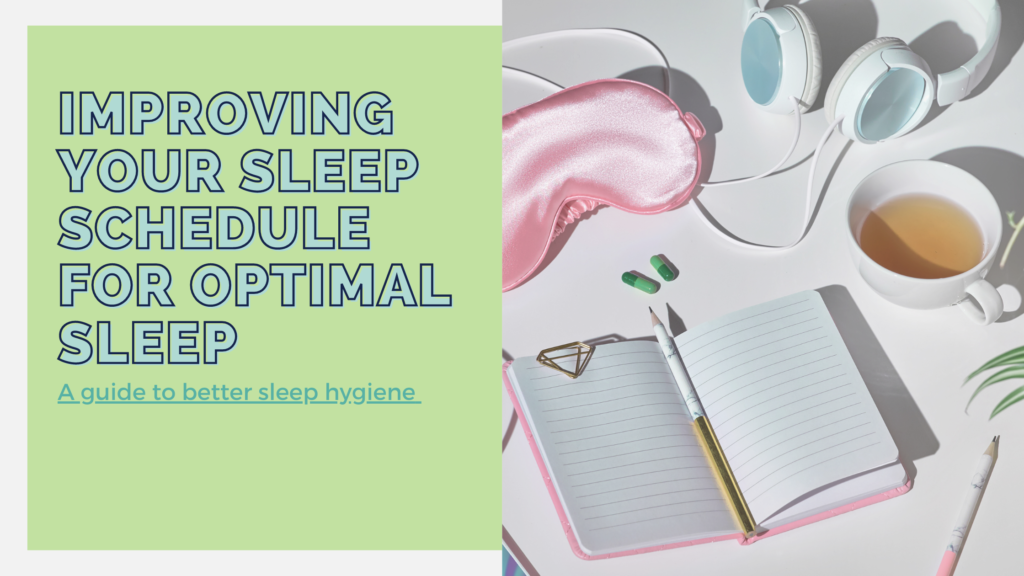Improving your Sleep Schedule for Optimal Sleep
Improving your sleep schedule for optimal sleep can make for an improved quality of life! Developing a sleep hygiene routine along with consistent bedtimes can have optimal effects on your days. While achieving optimal sleep can be difficult at times, we hope the below tips will help get you there. Nap free days, here I come!
Achieving optimal sleep every night is crucial to keeping your mental and physical health in check, yet so many people struggle to get enough sleep. Studies have shown that lack of quality sleep can result in higher risks of certain diseases and medical conditions. These can include obesity, type 2 diabetes, high blood pressure, heart disease, stroke, poor mental health, and more. Individuals experiencing difficulty sleeping should consult a board-certified sleep physician to determine if a sleep disorder is present. With that being said, if you suffer to maintain optimal deep sleep, improving your sleep hygiene is crucial.
According to the National Sleep Foundation, the below table indicates the proper amount of sleep per day for different age ranges:
Finally, let’s get into some tips to help you create a calm, intentional bedtime routine. Here are some tips to help achieve consistency with your routine. A productive day starts the night before!
5 TIPS TO FIX YOUR SLEEP SCHEDULE:
1) Set a consistent time to go to bed and to wake up, and stick to it!
-
“As a general rule, it’s easier to push away sleep than to advance sleep,” says Rafael Pelayo, MD, clinical professor at the Stanford Sleep Disorders Clinic and the Stanford University School of Medicine in California. To effectively get to sleep earlier, Dr. Pelayo recommends adjusting your bedtime no more than 15 minutes earlier every two to three days.
2) Give yourself at least an hour to wind down before bed
-
During this time, prep for your day ahead! Remember, your morning routine should start at night. Use this time to lay out clothes for the next day. You can even schedule your coffee machine to brew your favorite cup at the time you’re supposed to wake up. This will help motivate you to get out of bed faster!
3) Limit the use of electronics an hour before bedtime
4) Try journaling, meditating, or even doing yoga before bed
-
We found an amazing guided meditation here, available via audio and text, that guides you through an intentional, yet unforced meditation that can hopefully guide you through mindfulness to sleep. Remember to let your thoughts flow as easily out of your mind as they arrived. It is normal to have thoughts, don’t get caught up in them. Most importantly, avoid putting pressure on yourself to sleep, let it come as it may!
-
Another great tactic during this time of the night is to write out your intentions for the day ahead. This can include whether that is a to-do list or a goal you want to accomplish. Close your eyes and imagine yourself completing those tasks. This will help you wake up feeling motivated and ready to take on the day!
- Check out our article here for a simple guide to meditation for beginners!
5) Expose yourself to the sunlight within the first two hours of waking up
-
Your morning routine is just as important in achieving optimal sleep hygiene as your nighttime routine is. It is recommended to start your day with a fresh dose of sunlight within the first two hours, weather willing. Natural light helps to regulate the body’s circadian rhythm, which helps you to wake up feeling refreshed! Check out the article here to learn more about the science behind the importance of sunlight in the morning!
As mentioned in the introduction of today’s article, it is important to note that all tips are only effective if the person is not suffering from an undiagnosed sleep disorder, such as obstructive sleep apnea. If you or a loved one suffers from snoring and can’t seem to wake up feeling refreshed no matter how much sleep you get, schedule an appointment with your doctor, as this may be a sign of a serious health concern. You may be a candidate for oral appliance therapy! It’s time to sleep better, Columbus!
Interested in learning more about sleep health and factors that can disrupt your sleep? Check out our article here where we discuss the serious implications daylight saving time has on your sleep health.
Lastly, if these tips helped you improve your sleep schedule, let us know in the comments below!





Hi! Someone in my Facebook group shared this site with us so I came to give it a look. I’m definitely loving the information. I’m book-marking and will be tweeting this to my followers! Great blog and great design.
Thank you so much for the support!